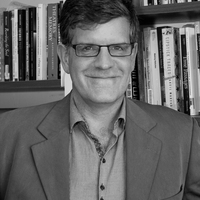David Deacon
Loughborough University, Social Sciences, Faculty Member
- Media Studies, Media and Cultural Studies, Media History, Political communication, Journalism, Journalism And Mass communication, and 10 morePublic Relations, Social Research Methods and Methodology, Communication, Cultural Studies, Social Media, Spanish Civil War, Political Science, Culture, New Media, and British Quangosedit
Research Interests:
Research Interests:
Research Interests:
WELL, WE KNOW who won the election. But who won the campaign? These are certainly not identical questions. For several weeks the second issue seemed of more moment than who would form the next Government. And, as in 1987, it may be that... more
WELL, WE KNOW who won the election. But who won the campaign? These are certainly not identical questions. For several weeks the second issue seemed of more moment than who would form the next Government. And, as in 1987, it may be that the two questions ...
Research Interests:
... In 1987, Jeff Rooker, then Labour's Local Government Spokesperson, claimed the publication of 'The Need for Change' booklet contravened 1985 Cabinet guidelines that stipulated such publications should only be issued... more
... In 1987, Jeff Rooker, then Labour's Local Government Spokesperson, claimed the publication of 'The Need for Change' booklet contravened 1985 Cabinet guidelines that stipulated such publications should only be issued after the publication of a Bill or White Paper, or with the ...
Research Interests:
This article considers the methodological implications of using digital newspaper archives for analysis of media content. The discussion identifies arange of validity and reliability concerns about this increasingly prevalent mode of... more
This article considers the methodological implications of using digital newspaper archives for analysis of media content. The discussion identifies arange of validity and reliability concerns about this increasingly prevalent mode of analysis, which have been under-appreciated to date. Although these questions do not deny a role for the use of proxy data in media analysis, they do highlight the need
Research Interests:
Debates about the sociology of news production have recently been influenced by two emerging research trends. The first has focused attention on the power of news sources to pre-structure news and current affairs, the second has addressed... more
Debates about the sociology of news production have recently been influenced by two emerging research trends. The first has focused attention on the power of news sources to pre-structure news and current affairs, the second has addressed the influence of non-official institutions in the news creation process. Drawing on research into communication activity in the British voluntary sector, this article discusses these new trends and provides extensive empirical data on the media strategies and objectives of a large and varied collection of voluntary organizations. The discussion also relates these findings to important contextual developments that are transforming the communication environment of these non-official agencies.
Research Interests:
Abstract There has been a growth of interest in 'holistic'approaches to the study of media communication over the recent period, in which analyses of media consumption and production have become more closely integrated. In... more
Abstract There has been a growth of interest in 'holistic'approaches to the study of media communication over the recent period, in which analyses of media consumption and production have become more closely integrated. In welcoming this trend, this article ...
Research Interests:
This analysis of the 2005 general election focuses on the way the formal campaign was reported, in their different ways, by national and local broadcasters and newspapers. Having assessed how much attention the various news media devoted... more
This analysis of the 2005 general election focuses on the way the formal campaign was reported, in their different ways, by national and local broadcasters and newspapers. Having assessed how much attention the various news media devoted to the election, Norris et ...
Research Interests:
This article examines a topic that has been neglected in political communication research: mainstream news reporting of the “appointive state” in Britain. This perspective is vital in the light of state retrenchment and an expanded role... more
This article examines a topic that has been neglected in political communication research: mainstream news reporting of the “appointive state” in Britain. This perspective is vital in the light of state retrenchment and an expanded role for quangos (quasi-autonomous nongovernmental organizations). The analysis provides an overview of long-term trends in media reporting of general principles of quasi government and an
Research Interests:
This paper presents findings from the first systematic appraisal of mainstream news reporting of the appointive government in Britain. Such a perspective is urgently needed in the light of the expanded role and influence of... more
This paper presents findings from the first systematic appraisal of mainstream news reporting of the appointive government in Britain. Such a perspective is urgently needed in the light of the expanded role and influence of ‘Quasi-Autonomous Non Governmental Organisations’ in public affairs. This paper provides an overview of long-term trends in media reporting of general principles of quasi-government and an examination of the routine coverage of public bodies that can be classified as quangos. These related exercises show that the ‘new managerialist’ ethos that fuelled the recent expansion of the appointive state finds little endorsement in general media discourses about the quango state, but is often implicitly reflected in journalists' treatment of specific organisations and their work. Copyright © 2001 Henry Stewart Publications
Research Interests:
This article examines the public communication activities of quasi-autonomous non-governmental organizations (`quangos') in Britain, paying particular attention to their media relations. The analysis shows that the popular image... more
This article examines the public communication activities of quasi-autonomous non-governmental organizations (`quangos') in Britain, paying particular attention to their media relations. The analysis shows that the popular image of these public bodies as highly introverted organizations needs revision, as many place considerable emphasis on public communication issues. However, this recognition contextualizes rather than invalidates concerns about accountability within this tier
